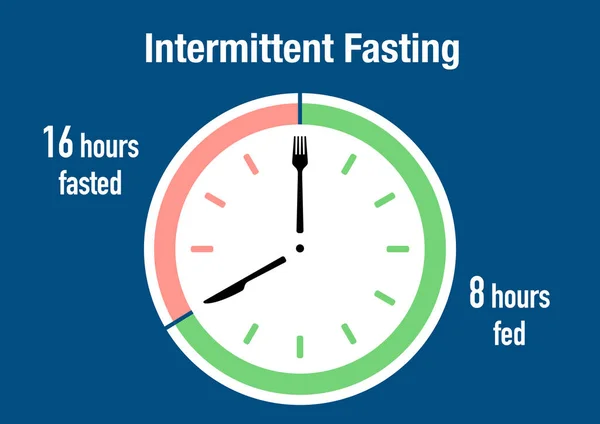Intermittent fasting has gained popularity in recent years as an effective method for weight management and improving overall health.
This guide aims to provide a comprehensive overview of intermittent fasting, including its benefits, different fasting methods, tips for success, and potential side effects.
By understanding and implementing intermittent fasting correctly, you can optimize your health and achieve your wellness goals.
Jump to section
What is Intermittent Fasting?
Intermittent fasting is not a diet but rather an eating pattern that cycles between periods of fasting and eating. It focuses more on when you eat rather than what you eat. There are various methods of intermittent fasting, but the most common ones are:
- 16/8 method: This involves fasting for 16 hours each day and restricting your eating window to 8 hours.
- Alternate-day fasting: This entails fasting every other day, consuming very few calories (around 500-600) on fasting days.
- 5:2 diet: This method involves fasting for two non-consecutive days of the week while eating normally on the other five days.
Health Benefits of Intermittent Fasting
Intermittent fasting offers numerous health benefits, which include:
- Weight loss: Intermittent fasting can help control calorie intake and promote fat loss, making it an effective tool for weight management.
- Insulin sensitivity: Fasting helps improve insulin sensitivity, which can lower the risk of type 2 diabetes and metabolic syndrome.
- Cellular repair and autophagy: During fasting, the body initiates cellular repair processes and activates autophagy, which is the body’s way of cleaning out damaged cells and preventing chronic diseases.
- Brain health: Intermittent fasting may enhance brain function, improve focus, and protect against neurodegenerative diseases like Alzheimer’s and Parkinson’s.
- Inflammation reduction: Fasting can reduce inflammation in the body, which is a risk factor for many chronic diseases.
- Heart health: Intermittent fasting may help lower blood pressure, and cholesterol levels, and decrease the risk of heart disease.
Tips and Strategies for Successful Intermittent Fasting
Here are some tips to ensure a successful intermittent fasting experience:
- Start gradually: If you are new to fasting, extend your fasting periods gradually. Please start with the 16/8 method and adjust it according to your comfort level.
- Stay hydrated: Drink plenty of water, herbal tea, or other non-caloric beverages during fasting periods to stay hydrated and curb hunger.
- Eat balanced meals: During eating windows, focus on consuming nutrient-dense foods. Include a variety of fruits, vegetables, lean proteins, whole grains, and healthy fats in your meals.
- Listen to your body: Pay attention to your hunger and fullness cues. Don’t force yourself to eat if you are not hungry, and stop eating when you feel satisfied.
- Keep busy: Engage in activities to keep your mind off food during fasting periods. Stay active, embark on hobbies, or practice mindfulness techniques to distract yourself from hunger pangs.
- Be flexible: Intermittent fasting is not a strict rulebook. It’s important to embrace flexibility and adjust fasting schedules to accommodate social events and personal preferences.
Potential Side Effects
While intermittent fasting can be safe for most people, it’s essential to consider potential side effects, especially if you have certain medical conditions or are pregnant/nursing. Some common side effects may include:
- Initial hunger: You may experience hunger and food cravings in the beginning, but these often diminish as your body adapts.
- Low energy: Some individuals may experience transient fatigue or low energy levels during fasting, particularly when starting out. This usually resolves as your body adjusts to the fasting schedule.
- Disrupted sleep: Fasting can sometimes disrupt sleep patterns, especially if you consume caffeine or eat late at night. Adjusting your fasting schedule or managing your eating habits may help alleviate this issue.
It’s important to consult with a healthcare professional, especially if you have underlying health conditions or are taking medication, before starting intermittent fasting.
Who should not fast?
- Pregnant or breastfeeding women, people with chronic diseases, and older people should not fast, as it can have negative effects on their health
- Children, people under the age of 25, and people who take insulin or other medications to control diabetes should also avoid fasting
- People with sleep problems, a history of disordered eating or eating disorders, and those who practice vigorous workouts or are underweight or struggling with weight gain should also avoid fasting
Conclusion
Intermittent fasting is a versatile and powerful tool that can provide several health benefits when practiced correctly. Remember that the key to successful intermittent fasting is finding a method that suits your lifestyle and allows you to maintain it long-term. Emphasize a balanced and nutritious diet during eating windows to support overall health. Lastly, be mindful of your body’s signals and adjust your fasting schedule accordingly. By implementing the strategies and being consistent, you can reap the rewards of intermittent fasting and improve your overall well-being.



